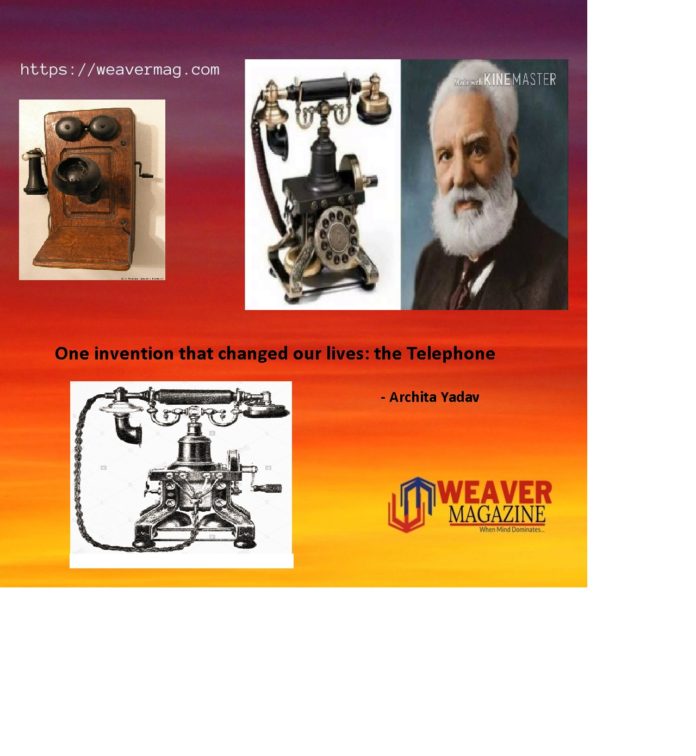Among many great achievements and innovations, a significant one is the invention of the telephone. Phones have become an imperative part of our lives. In the contemporary world, we are so much dependent on phones that we just can’t think of living without them.
Not just communication, be it learning, shopping, entertainment, or anything trivial; everything is available at the ease of our fingertips. But all this improvement and innovation that took place was possible because of the pioneering experiments by Graham Bell.
The invention of the telephone by Alexander Graham Bell in 1876, was a world-changing event and a breakthrough in communication. It has allowed people to communicate without physically being together. And today through smartphones we get everything easily available at the click of a button. This efficient device has made our lives plain-sailing. People may be miles away from one another but still, they are in touch with each other. Using a phone is just like having the world in your palm. It also changed the way social interaction takes place. Communication over the telephone broadened the range of individuals one could interact with. Long-distance relationships became possible. It helped in maintaining an in-depth bond with families and communities.
Bell’s mother was deaf and his father Melville Bell was a teacher of elocution, famous for helping the deaf in learning to speak. The Scottish-born inventor Bell dedicated all his life to the education of the deaf. On the other hand, he worked on developing the telegraph to make money. While experimenting he heard sound vibrations reflected on the wire he stretched between two rooms. Owing to his extensive knowledge of the human ear, and how it amplifies the vibrations, he realized that it was possible to transmit the human voice. He continued his research and studies and was able to invent a new means of communication.
Bell was granted the patent he applied for on 7th March 1876 by the US Patent and Trademark Office. The first telephone call was made on 10th March. Graham Bell was on one end, and electrical engineer Thomas Watson who assisted him was on the other. The conversation made was: “Mr. Watson! Come here. I want to see you.” This was perhaps the foremost miraculous start from where the present-day smartphones have evolved. Following the initial tests, he then improvised the technique. He ran a wire across fences and telegraph posts over about eight miles from Brantford, Canada to his nearby farm and was able to hear people on the other side of the line in Brantford. He then worked to bring perfection to that technology.
In 1892, Alexander Graham Bell made an effort to make the primary long-distance telephone call and his sound reached from New York to Chicago. Following this, the telephone network was rapidly spread to the entire world within a decade. On May 23rd, 1909 the primary manual telephone central of Turkey started providing services in Istanbul. On March 6th, 1983 Motorola launched the first mobile cell phone DynaTAC 8000X for consumer use. In 1992 Finnish Prime Minister Harri Holkeri made the first GSM call of the world. The first smartphone Nokia 900 Communicator was launched in 1996. Followed by Apple in 2007 with the introduction of the “iPhone” with three major features: touchscreen, music player, and internet.
However, there is a lot of controversy about the original inventors of the telephone. Elisha Gray, an American engineer, and Bell had submitted their independent patent applications concerning telephones to the patent office in Washington on February 14, 1876. Gray’s petition arrived a few hours before Bell’s, but a legal battle took place followed by Bell’s success. Another intriguing aspect is that Meucci, an Italian immigrant began developing the telephone prototype, but economic problems prevented him from going ahead. The plot thickens when Johann Philipp Reis claimed of successful sound transmissions, but Bell’s March 10 sentence to Watson is credited as the first clearly spoken and understood voice communication via phone. Often credit goes to the inventor of the best working model rather than the original inventor. The same happens with Bell. Till date, this hasn’t been demystified who the progenitor is.
When mobile phones were introduced, they were viewed as an exclusive form of telephone service that might suit certain workforces, such as craftsmen, photographers, and repairmen. In the 1870s, it was regarded as a luxury for businessmen, doctors, craftsmen, etc. Only the affluent people had access to telephones. For decades the common people weren’t acquainted with the technology.
In the past when ideas were shared between individuals, far away, it took a significant amount of time to correspond. But now there was a more efficient way to share ideas and collaborate. Working with another individual became far easier, and allowed for newer ideas to come forward. The invention of the phonephone also meant that folks could share events at a quicker rate.
The fact that without the telephone we can’t exist today is not unknown to people. And so it has been called one of the greatest inventions of all times. This convoluted discovery has made our lives much simpler. And all this has moved it from the list of luxuries to a necessity in the present era. The new simple communication encourages us to speak more to each other, bringing us together as a worldwide community. This need for fast gratification is what led to further inventions like radios, television, and computers.
Why the invention of the telephone is amongst the greatest can be justified by the fact that no part of our lives is left untouched by this gadget.
“The telephone gives us the happiness of being together yet safely apart”
– Mason Cooley










